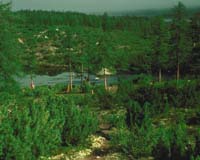| . |  |
. |
Washington DC (SPX) May 12, 2011 Survival in the depths of the tropical rainforest not only depends on a species' ability to defend itself, but can be reliant on the type of cooperation researchers discovered between ants and tropical trees. The research, published in Biotropica, reveals how the ants use chemical signals on their host tree to distinguish them from competing plant species. Once a competing plant is recognised the ants prune them to defend their host. The species of plant inhabiting ant Pseudomyrmex triplarinus are found in the Peruvian rainforest and as researchers from Colorado State University found out, they have evolved a symbiotic relationship with Triplaris americana trees, receiving shelter and sustenance in return for defence. "The ants inhabit hollow channels inside the tree and aggressively fight off any invaders including other plants, yet how these ants recognise their host tree compared to other plants has not been studied," said lead author Dr Tiffany Weir. "We found that the ants distinguish between their host trees and encroaching species through recognition of the plant's surface waxes." From the Tambopata National Reserve in Peru Dr Weir, and Dr. Jorge Vivanco, the team's leader, used a creative set of experiments to demonstrate how ants inhabiting the branches of T. americana trees recognise species-specific chemical signals embedded in the leaf surface. Species of grass and fern were harvested from the area and replanted around several T. Americana trees which hosted ants. The team then monitored ant pruning behaviour of these competing species for five weeks. Detached leaves from several trees, including T. americana, were then attached to host trees with a sewing pin. Daily records revealed that more leaves belonging to non-host plants were removed by the ants. A similar experiment looked at removal of filter papers coated with surface waxes that had been extracted from host tree leaves compared with papers coated with waxes from a closely related species, T. poeppigiana. The ants more aggressively attacked papers coated with the T. poeppigiana extracts demonstrating both the extremely high degree of specificity for their host tree and that the chemical signal allowing them to accurately distinguish their host from other plants is present in leaf surface waxes. The team also found that even during rainy periods when ant activity was minimal they still defended their host tree if disturbed. This included attacking ants from a neighbouring nest if they ventured too close to the tree. "Researchers have observed pruning behaviour in ants before, and the explanations for this type of behaviour range from limiting competition to host plants to preventing foliar bridges between the host tree and other plants that would allow invading ant species access to the colony," concluded Weir. "However, this is one of the first studies to examine the specificity and chemical signals involved in this particular ant-plant interaction."
Share This Article With Planet Earth
Related Links - Forestry News - Global and Local News, Science and Application
 Russian police arrest 25 activists in highway protest
Russian police arrest 25 activists in highway protestMoscow (AFP) May 8, 2011 Russian police on Sunday arrested 25 activists as they held a protest against the felling of a forest outside Moscow to build a disputed highway. Among those detained were the campaign's coordinator, Yevgenia Chirikova, liberal Yabloko party leader Sergei Mitrokhin and the leader of an opposition left-wing movement, Sergei Udaltsov, who spoke to AFP from a police station. "We were detain ... read more |
|
| The content herein, unless otherwise known to be public domain, are Copyright 1995-2010 - SpaceDaily. AFP and UPI Wire Stories are copyright Agence France-Presse and United Press International. ESA Portal Reports are copyright European Space Agency. All NASA sourced material is public domain. Additional copyrights may apply in whole or part to other bona fide parties. Advertising does not imply endorsement,agreement or approval of any opinions, statements or information provided by SpaceDaily on any Web page published or hosted by SpaceDaily. Privacy Statement |